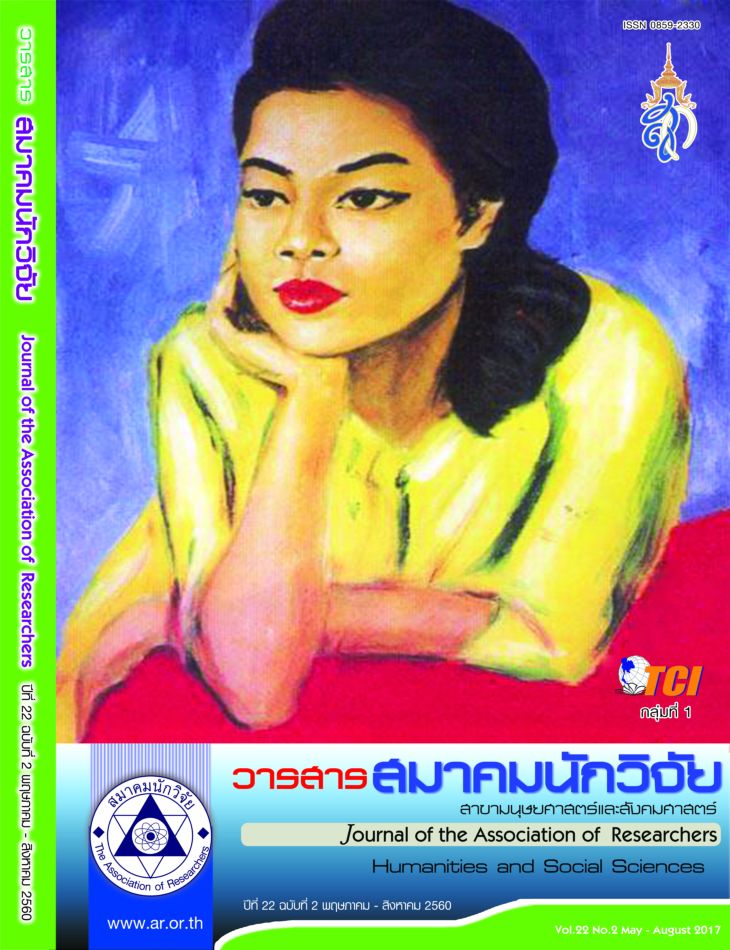A Study of Constructive Organizational Culture and Learning Organization in Mahamakut Buddhist University, Srilanchang Campus
Main Article Content
Abstract
The purpose of this research were to study the current state of constructive organizational culture and learning organization, the relationship between constructive organizational culture and learning organization, and the dimensional factors of constructive organizational culture affecting the learning
organization in Mahamakut Buddhist University. Srilanchang Campus. The sample group in this study were 113 personnel at Srilanchang Campus. The research instrument were a questionnaire constructed in the 5 scales rating. The data were analyzed by using the computer software. The statistical analysis
were performed using as follows; the descriptive statistics were frequency, percentage, mean, standard deviation and the inferential statistics were correlation coefficient and multiple regression analysis. The results had shown that; The average of constructive organizational culture both overall and each dimension were high level. Average ordering in descending were to be humanistic encouraging,affiliative, achievement, and self-actualizing. The average of learning organization both overall and each compositions were high level. Average ordering in descending were to be mental model, shared vision,system thinking, team learning, and personal mastery. The constructive organizational culture as overall,the achievement and affiliative dimensions, were high relationship with the learning organization, while the relationship of the other elements were moderate level. All relationships were in the positive way and correlation coefficient were statistic significant at the .01 level. The dimensional factors of constructive organizational culture affecting the learning organization including achievement, selfactualizing and affiliate. These factors have a predictive power of learning organization at 63.90 percent (R2= .639). The people-oriented dimension not affecting the learning organization. Considering the regression coefficients with raw scores (B) and standardized scores (Beta) of the predictors variables,including the achievement (X1) the self-actualizing (X2) and the affiliative (X4), could predict the learning organization as the following equations.
Raw score equation γ = 1.766 + .258X4 + .256X1 + .219X2
Standardized score equation γ = .345X4 + 327X1 + .279X2
Article Details
บทความที่ปรากฏในวารสารนี้ เป็นความรับผิดชอบของผู้เขียน ซึ่งสมาคมนักวิจัยไม่จำเป็นต้องเห็นด้วยเสมอไป การนำเสนอผลงานวิจัยและบทความในวารสารนี้ไปเผยแพร่สามารถกระทำได้ โดยระบุแหล่งอ้างอิงจาก "วารสารสมาคมนักวิจัย"
References
กาญจนา เกษร. (2555). ความสัมพันธ์ระหว่างวัฒนธรรมองค์การกับประสิทธิผลของโรงเรียน สังกัด สำนักงานเขตพื้นที่การศึกษาประถมศึกษา ปทุมธานี เขต 1. วิทยานิพนธ์ปริญญาศึกษาศาสตรมหาบัณฑิต, สาขาวิชาเทคโนโลยีการบริหารการศึกษา, คณะครุศาสตร์อุตสาหกรรม, มหาวิทยาลัยเทคโนโลยีธนบุรี.
กรรณิการ์ โพธิ์ลังกา. (2556). การศึกษาลักษณะส่วนบุคคล วัฒนธรรมองค์กรลักษณะสร้างสรรค์ และสภาพแวดล้อมภายในองค์กรที่มีผลต่อประสิทธิผลการปฏิบัติงานของพนักงานระดับปฏิบัติการในย่านธุรกิจอโศกกรุงเทพมหานคร.การค้นคว้าอิสระปริญญาบริหารธุรกิจมหาบัณฑิต มหาวิทยาลัยกรุงเทพ.
สมคิด ชุมนุมพร. (2549). การศึกษาส่งเสริมองค์กรแห่งการเรียนรู้ของผู้บริหารสถานศึกษาสังกัดสำนักงานเขตพื้นที่การศึกษาปทุมธานี เขต 1. วิทยานิพนธ์การศึกษามหาบัณฑิต สาขาวิชาการบริหารการศึกษา มหาวิทยาลัยศรีนครินทรวิโรฒ.
อภิชชยา บุญเจริญ. (2556). อิทธิพลของวัฒนธรรมองค์การต่อการเป็นองค์การแห่งการเรียนรู้. วิทยานิพนธ์ปริญญาบริหารธุรกิจมหาบัณฑิต สาขาวิชาการจัดการ บัณฑิตวิทยาลัย มหาวิทยาลัยศรีนครินทรวิโรฒ.
อัมพร ปัญญา. (2557). “ปัจจัยที่ส่งผลต่อลักษณะการเป็นองค์กรแห่งการเรียนรู้ ในวิทยาลัยราชพฤกษ์” วารสารปัญญาภิวัฒน์.ปีที่ 5 ฉบับที่ 2 ประจำเดือน มกราคม – มิถุนายน.
References
Amporn Panya. (2014). “Factors affecting Characteristics of Learning of Learning Organization in Ratchaphruek College” Panyapiwat Journal. Vol. 5 No. 2 January -June 2014. (In Thai).
Apitchaya Boonjarern. (2013). The Influence of Organizational Culture on the Learning Organization Development. Thesis Master of Education in Educational Administration Department of Educational Administration Graduate School, Srinakharinwirot University. (In Thai).
Kannika Polangka. (2014). A Study of the Personal Characteristics, Constructive Organizational Culture,and Internal Environment toward Employees' Work Performance at the Operational Level inAsoke (Central Business District), Bangkok. Independent Study Master of Business Management Graduate School, Bangkok University. (In Thai).
Karnjana Kasorn. (2012). The Relationship Between Organizational Culture and the Effectiveness of School Under Phathumtani Primary Educational Service Area Office 1. Thesis Master of Education in Educational Administration Department of Educational Administration Graduate School, Silpakorn University. (In Thai).
Kittiya Chantarasena. (2013). The Relationship between Leadership and Learning Organization of School in Nakhon Pathom Primary Educational service Area office 1. Thesis Master of Education Program in Educational Administration Department of Educational Administration, Graduate School,Silpakorn University. (In Thai).
Marquardt, M. J. (1996). Building the Learning Organizational : A systems approach to quantum improvement
and global success. New York : McGraw-Hill
Senge, Peter M. (1990). The Fifth Discipline : The Art and Practice of the Learning Organization. New York:Doubleday.
Somkit Chumnumporn. (2006). A study of School Learning Organization Encouragement of school administrator in Pathumthani Education Area 1 Thesis Master of Education in Educational Administration. Graduate School, Srinakharinwirot University. (In Thai).


